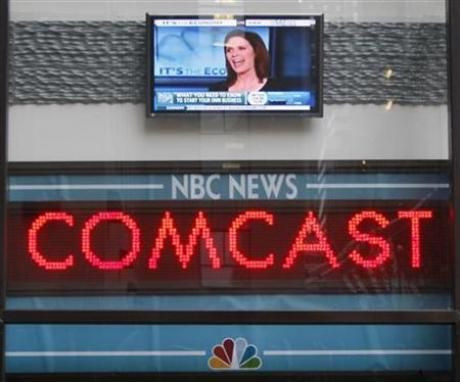Comcast Reveals Punishment For Suspected Pirates As Part Of 'Six Strikes' Policy; Non-Stop Pop-Up Browser Alerts

The controversial six-strikes anti-piracy policy is set to go into effect, and the Internet service providers are revealing how they plan on punishing possible pirates. Comcast revealed that after four alerts it will bombard the user with persistent pop-up ads that will prevent access to the Internet, effectively disabling any online browsing.
The Copyright Alert System, or CAS, also known as the six strikes policy, was established by the Motion Picture Association of America, Recording Industry Association of America and Internet service providers, including AT&T, Verizon, Comcast and Time Warner, as a way to educate users about the dangers and legal ramifications of piracy. According to the Center for Copyright Information, or CCI, the CAS is meant “to educate consumers about the importance of copyright protection and help them find better ways to enjoy digital content. Through ... CAS, ISPs will make consumers aware of possible illegal activity that has occurred over peer-to-peer networks using their Internet accounts.”
These alerts will include information about what files were downloaded, the type of suspected illegal activity and when the suspected illegal download occurred. After four such alerts, each ISP is allowed to implement their own punishment for suspected pirates. Punishment could result in a reduction in Internet speed, downgrade in service, browser redirection or needing to complete a “copyright education program,” CCI noted.
Once the suspected illegal downloads are stopped or one once the user contacts their ISP, the alerts will stop. When the six-strikes policy went into effect on Monday, many were unsure what punishments the ISPs would levy to users who receive four alerts. On Wednesday, Comcast revealed its punishment for repeat offenders.
For users suspected of piracy, Comcast said, “If a consumer fails to respond to several Copyright Alerts, Comcast will place a persistent alert in any Web browser under that account until the account holder contacts Comcast’s Customer Security Assurance professionals to discuss and help resolve the matter.”
After four alerts, Comcast will launch pop-ups in a user’s browser but it will not interfere with “any essential services obtained over the Internet,” Comcast noted. The ISP also stated that it will not terminate any user’s account as part of the CAS. TorrentFreak notes that Comcast has not mentioned a time frame for how quickly a user should contact their ISP or if any follow-up is necessary to restore normal service.
Verizon’s punishment for suspected repeat offenders differs from Comcast as it elected to choose a reduction in Internet speed. According to Verizon, “If we receive more than two notices related to your account, we will send you an alert via a Web page pop-up that will require you to click to acknowledge receipt of the alert. If we receive a fifth copyright notice from copyright owners related to your account, we will send you an alert via a Web page pop-up notifying you that, unless you elect to seek an independent review of the validity of the notices you received, your Internet access service speed will be temporarily reduced for a period of two days to a rate of 256Kbps (a little faster than typical dial-up speed).” Users will be notified 14 days in advance of any speed reduction. A sixth alert will result in a speed reduction for three days.
For those who continue to be suspected of piracy, the ISPs could be asked to report the IP addresses of users to the MPAA or RIAA, TorrentFreak noted. The MPAA or RIAA could then subpoena the ISPs in order to get the necessary information needed for a possible lawsuit.
A quick primer of how the Copyright Alert System works can be viewed below.
© Copyright IBTimes 2025. All rights reserved.






















